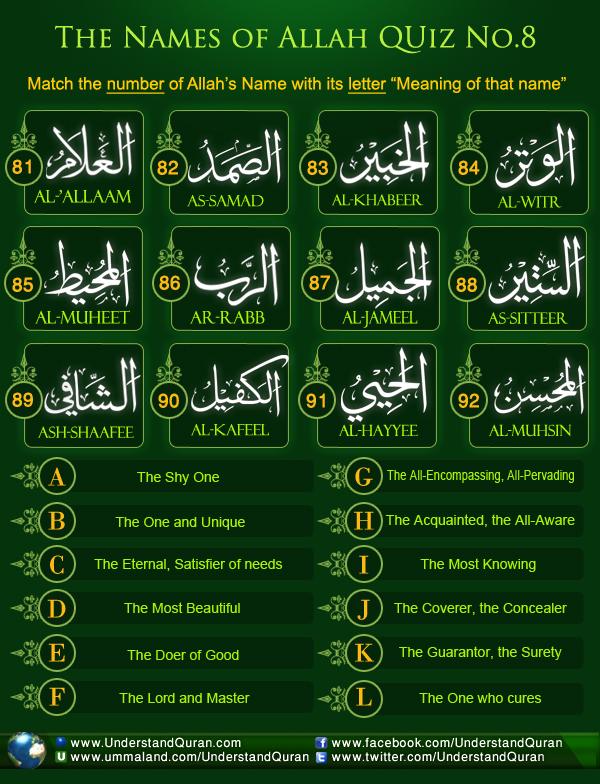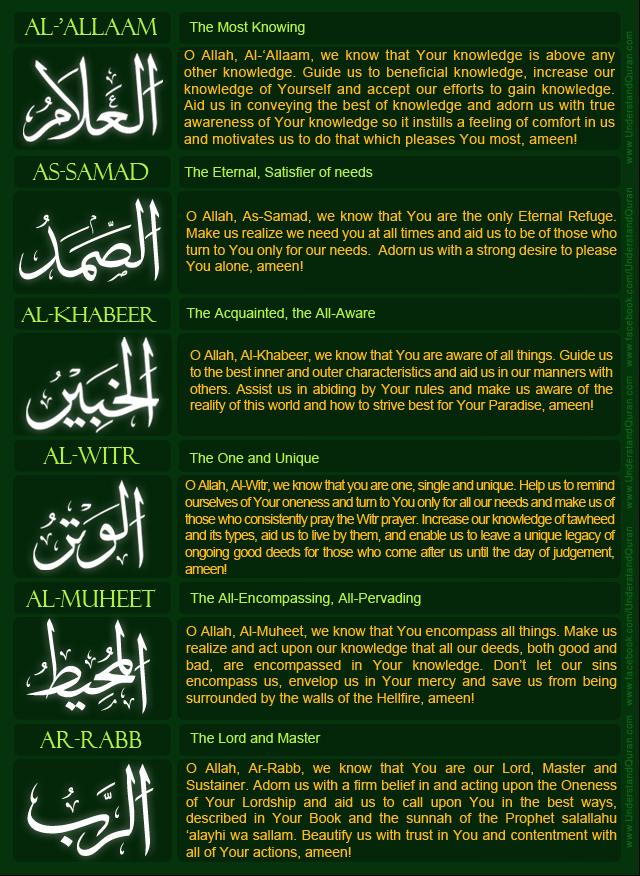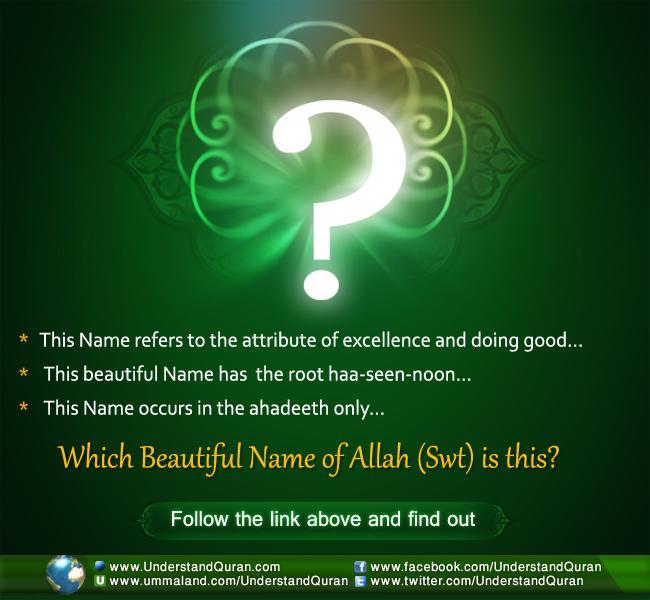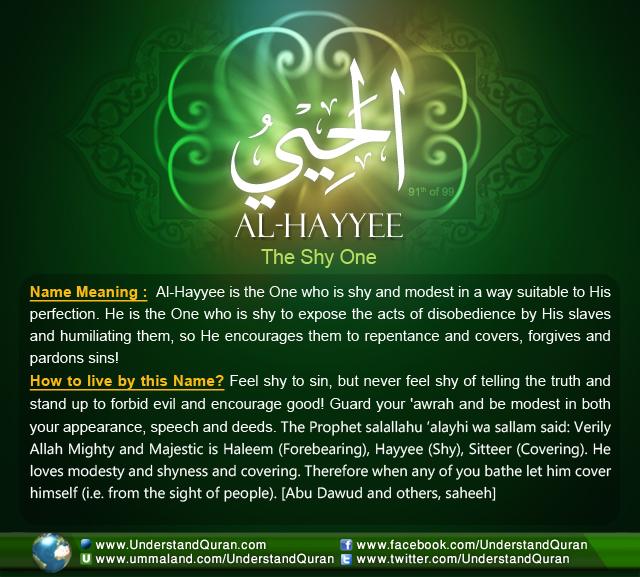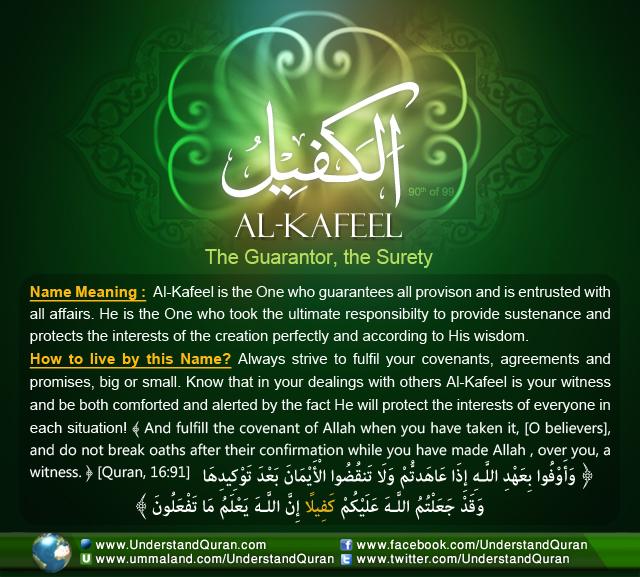And the Answer is . . . AR-RABB
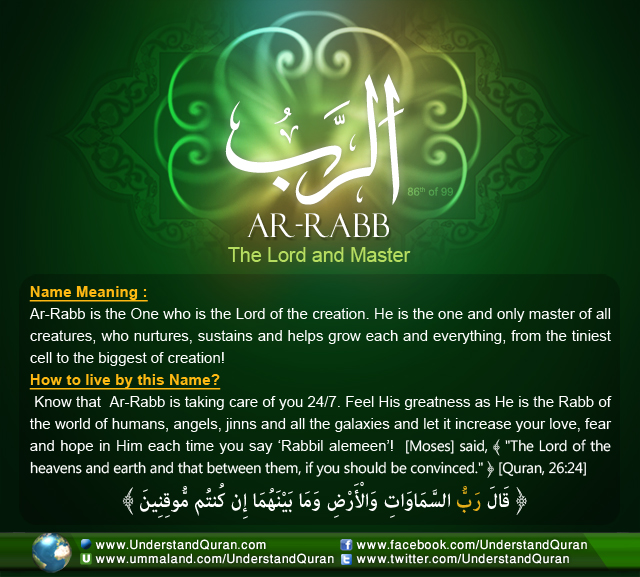
Allah calls Himself Ar-Rabb— The Lord, the Master— on more than 900 occasions in the Quran. Ar-Rabb is the only one who truly takes care of the whole creation, nourishing it in the most perfect way. He is the one who created us, who sustains us, who fosters and regulates all beings from the earliest state to that of the highest perfection!
The Lord, the Master, the Creator and Nurturer
Rabb comes from the root raa-baa-baa, which points to three main meanings. The first main meaning is to be lord, owner, or master. The second main meaning is to take care of, nourish, sustain, and provide for, and the third is to raise or bring up.
This root appears 980 times in the Quran in four derived forms. Examples of these forms are rabbee (“my Lord”), al rabaaniyoona (“the Rabbis”), and ribbiyyoona (“religious scholars”).
Linguistically, Rabb is a term used for the owner (maalik), the master (as-sayyid), the one who takes care of, sustains, nourishes (al-qayyoom), and provides or takes care of everything (ar-razzaaq). [Lisan al-Arab by ibn Mandhoor].
The word tarbiyyah is also derived from the same root, and it means to take care of. It is often used to indicate how we bring up and nurture our children.
Rabb is also used with an adjective to refer to people, indicating the “master” or the one who is obeyed, for example rabb ud daar— the master of the house. Only Allah is Ar-Rabb; He is the true and complete owner of everything in existence and the only one who takes care, nourishes, and fosters everything that exists through every stage of existence.
Ar-Rabb Himself says: . . . [All] praise is [due] to Allah, Lord of the worlds [Quran, 1:2] . . .And [mention, O Muhammad], when your Lord said to the angels, Indeed, I will make upon the earth a successive authority . . . [Quran, 2:30] and . . . At that, Zechariah called upon his Lord, saying, My Lord, grant me from Yourself a good offspring. Indeed, You are the Hearer of supplication. [Quran, 3:38]
The Tawheed of Lordship
One of the types of tawheed a true Muslim should believe in and live by is tawheed ar-ruboobiyyah, the Oneness of Allah’s Lordship. This means that you affirm Allah is one and unique in His actions. Examples are creation, controlling affairs, provision, giving life and death, and sending down rain. It is firmly believing that only Allah nourishes and sustains and that no other being can do the things Allah ‘azza wa jall does.
For example the Mushrikeen among whom the Prophet salallahu ‘alayhi wa sallam was sent did not disagree with this type of tawheed; they affirmed it in general terms. Allah Ar-Rabb says: And indeed if you ask them: Who has created the heavens and the earth? They will surely say: The All-Mighty, the All-Knower created them. [Quran, 43:9] However they did not affirm tawheed of worship and divinity (tawheed ul uloohiyyah), and worshipped idols.
Only affirming the Lordship of Allah is not sufficient for someone to be a true Muslim; you must also affirm what is implied by this— the oneness of the divinity of Allah— and thus devote your worship to Allah alone!
How Can You Live By This Name?
1. Feel it when you say “Rabb-il-‘Alameen.”
In your five prayers, you recite surah Al-Fatiha seventeen times a day, and which ayah do you recite as part of this opening surah? Alhamdulillahi Rabb-il-‘Alameen– All praise and thanks are to the Lord of the Worlds. Next time you say this, feel the greatness of your Rabb and imagine He is not only the Rabb of the world of humans, but also the Rabb of the angels, jinns, and all the galaxies, and He takes care of everything in existence 24/7. Let this increase your love, fear and hope in Him each time you say “Rabb-il-‘Alameen!”
Did you also notice that in each prayer, in each rukoo’, you say ‘subhana rabbiyal-‘adheem’ and in each sujood ‘subhana rabbiyal-‘alaa’? Each time you say these beautiful phrases of remembrance, truly remember that Allah is your Rabb. Each prayer is filled with this beautiful name!
2. Live by tawheed ar-ruboobiyyah.
Realize what tawheed ur-ruboobiyyah means in your daily life and really live by the fact only Allah is your Lord, Provider, and Sustainer. How many times do we turn to other people instead of Allah for our needs, when we have to make certain decisions? So when you or others are in ill health or afraid to sacrifice in the path of Allah, know that only Ar-Rabb can give life and death. When you are worried and distressed, know that only Ar-Rabb can bring benefit and ward off harm, and when you need something, know that only He answers prayers.
3. Use the “Rabbanaa” supplications from the Quran.
The most comprehensive and beautiful supplications can be found in the Quran and Sunnah, made by the prophets, messengers and pious before us. In the Quran you can find a selection of supplications starting with Rabbanaa, our Lord, or Rabbee, my Lord.
Use them in your daily life and memorize these Quranic dua which cover a wide range of topics. You can read and listen to them here.
A beautiful example is the supplication to make for the parents: And lower to them the wing of humility out of mercy and say, “My Lord, have mercy upon them as they brought me up [when I was] small.” [Quran, 17:24]
4. Trust in your Lord.
Know that Ar-Rabb takes care of you in all situations and trust in all His actions because they are good for you. Take inspiration from this beautiful ayah: [Moses] said, “No! Indeed, with me is my Lord; He will guide me. [Quran, 26:62]
Wallahu ta’alaa ‘alem.
O Allah, Ar-Rabb, we know that You are our Lord, Master and Sustainer. Adorn us with a firm belief in and acting upon the Oneness of Your Lordship and aid us to call upon You in the best ways, described in Your Book and the sunnah of the Prophet salallahu ‘alayhi wa sallam. Beautify us with trust in You and contentment with all of Your actions, ameen!
The Understand Quran Academy Team


